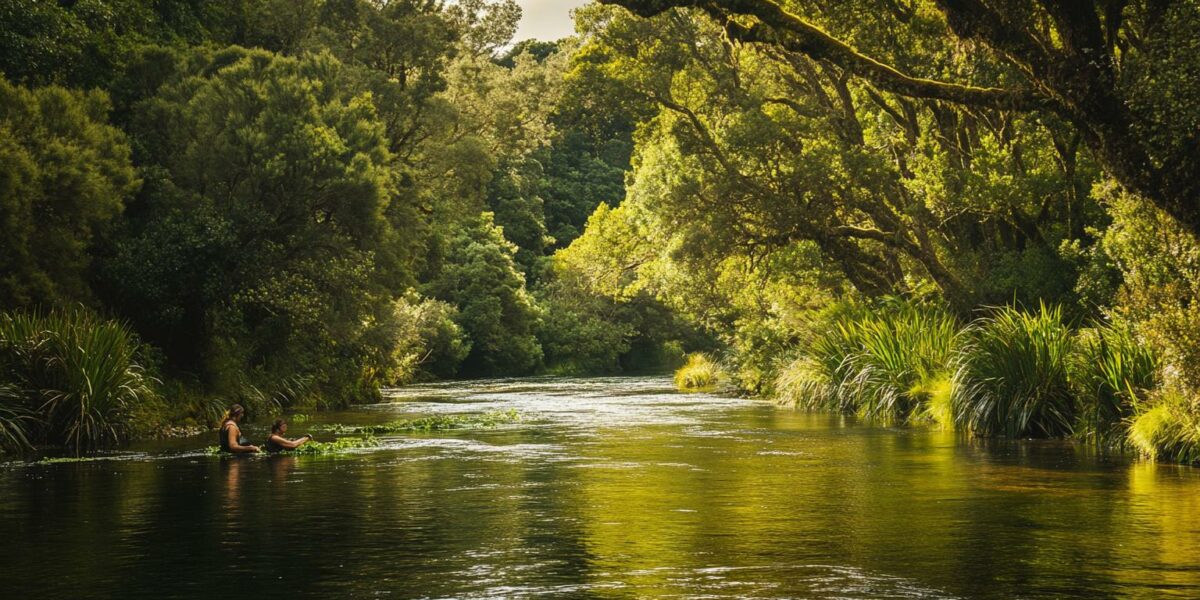Māori’s Unique Approach to Climate Change
In the picturesque town of Kaikōura, New Zealand, Māori communities are taking action against climate change. By clearing rivers of invasive weeds and planting native vegetation, they aim to restore the natural balance. This effort not only supports local biodiversity but also reflects centuries-old Māori wisdom.
Parkin-Rae, an indigenous Māori, emphasizes the importance of clean waterways. “The water gives life to everything, including us,” he says, highlighting the interconnectedness of humans and nature. This philosophy drives their conservation projects, which are essential for protecting their environment and culture.
These initiatives are part of a broader movement among Māori to address the catastrophic effects of climate change. As island nations like New Zealand face rising sea levels and extreme weather, indigenous knowledge becomes increasingly valuable in creating sustainable solutions.
Māori efforts are recognized in a 2023 report by the Ministry for the Environment, which predicts climate-related displacement among Māori communities. This displacement could disrupt Māori culture, making their conservation work even more crucial.
Reforestation and Predator Control Projects
One significant project led by Te Rūnanga o Kaikōura focuses on reforestation and predator control. Volunteers clear waterways, plant native species, and set traps for invasive pests. These activities help preserve the natural filtration system and support local wildlife.
The managing director, Rawiri Manawatu, points to the devastating impact of global warming and urban expansion on New Zealand’s ecosystem. He stresses the importance of native plants, which are considered part of the Earth Mother in Māori culture.
Manawatu lists the benefits of their work:
- Preservation of native plant species
- Support for biodiversity by providing food and shelter to wildlife
- Maintenance of the land’s natural filtration system
Māori communities rely on these plants and animals for food, medicine, and cultural practices. Reforestation is vital for maintaining their traditions and ensuring the health of their environment.
Whale Conservation Efforts
Whales hold a special place in Māori culture, seen as sacred ancestors and descendants of ocean gods. Climate change, however, threatens their habitat. The Whale Watch Kaikōura, a Māori-owned enterprise, works diligently to protect these majestic creatures.
The company’s chairman, Kahu, explains that whales are integral to Māori mythology. The community’s connection to whales is profound, and their conservation efforts are vital for both cultural and ecological reasons.
Global warming and human activities, such as ship strikes and overfishing, endanger whale populations. The Māori-led initiatives aim to mitigate these threats through quiet vessel designs and advanced tracking systems.
Mere Takoko, a conservation leader, highlights the role of whales in the whale pump process, which is crucial for ocean health. By protecting whales, Māori are also contributing to global climate change mitigation.
Dark Sky Conservation
At Lake Takapō, Māori communities are involved in the Dark Sky Project to preserve the night sky. This initiative, co-owned by the Ngāi Tahu tribe, combats light pollution and promotes astronomical research, which is essential for understanding climate change.
Artificial lighting contributes significantly to greenhouse gas emissions and disrupts natural rhythms. The Dark Sky Project aims to minimize these impacts by regulating light sources and enhancing the visibility of the night sky.
Māori astronomer Mikey Ratahi underscores the cultural significance of the stars. They serve as navigation tools and spiritual symbols, deeply embedded in Māori traditions.
Efforts to protect the dark sky foster both cultural heritage and scientific inquiry. By connecting with the cosmos, Māori communities continue to lead the way in environmental stewardship.



mia_catalyst
Does the reforestation project also help in reducing carbon emissions?
Clara
Sounds like a lot of effort! I hope it’s enough to combat climate change.
Jeremiah
Why don’t we hear more about indigenous contributions to climate change solutions in the media?
Alexis1
This is so inspiring! Thank you for sharing these incredible stories. 😊
jasper_midnight0
Dark Sky Conservation sounds cool! Are there similar projects elsewhere in the world?
Audrey
Love the holistic approach! We need more of this ancient wisdom in modern conservation.
kevin
That’s a lot of work! Do they get funding from the government or is it all community-driven?
HudsonStardancer
I’m really impressed by the whale conservation efforts. How can other countries learn from this?
Elijah6
Are there any specific native plants used in reforestation that are unique to New Zealand?
Felix7
Wow, this is amazing! How can we support these Māori initiatives from abroad? 🌍